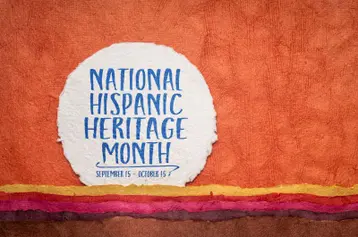Hispanic Heritage Month: Celebrating the Impact of Growth and Influence

Table of contents
- 1.A Growing Community
- 2.Economic Impact and Entrepreneurial Growth
- 3.Workforce Contributions
- 4.Cultural Impact
September 15 to October 15 marks National Hispanic Heritage Month, a time to honor and celebrate the rich history and cultural contributions of the Latino/Hispanic community. At TriNet, we are proud to join in this celebration, acknowledging the vibrant cultures, achievements, and economic impact of our Hispanic colleagues, customers, and partners.
A Growing Community
The Latino/Hispanic population in the United States has experienced remarkable growth. As of 2023, this demographic comprises 19.5% of the U.S. population, totaling over 65 million individuals—a significant increase from just 7% in 1980. From 2022 to 2023 alone, the Hispanic population grew by 1.8%, accounting for nearly 71% of the overall U.S. population increase during that period. This growth is driven by both natural increase and international migration.
The Hispanic population has surged more than sixfold since 1970, with substantial numbers residing in states like California, Texas, Florida, New York, and Arizona. In addition, regions with traditionally smaller Hispanic populations have seen rapid increases:
- North Dakota: 148% growth (2010-2020)
- South Dakota: 75% growth (2010-2020)
- Georgia: 96% growth (2000-2020)
- Pennsylvania: 38% growth (2010-2019)
- Florida: 34.9% growth (2010-2020)
Economic Impact and Entrepreneurial Growth
Latino-owned businesses have become a powerful force in the U.S. economy, expanding by up to 34% from 2007 to 2019. These businesses now number over five million and generate approximately $800 billion in revenue. Despite this success, Latino entrepreneurs face challenges such as limited access to capital and systemic biases, including discrimination, fewer networking opportunities and less access to business resources. However, organizations like the Latino Business Action Network (LBAN) and the U.S. Hispanic Chamber of Commerce (USHCC) are dedicated to supporting Latino business owners. With equal funding opportunities, Latino-owned businesses could contribute an additional $2.3 trillion to the U.S. economy.
Workforce Contributions
The Hispanic workforce is integral to the U.S. labor market. From 1990 to 2020, the number of Hispanic workers increased from 10.7 million to 29 million, with projections reaching 35.9 million by 2030. They represent over 30% of workers in agriculture and construction and nearly 25% in hospitality and food service. In 2017 alone, Hispanic workers earned more than $1 trillion and paid over $250 billion in taxes. Their younger median age of 38.5 years, compared to 42 years for the overall population, helps fill critical workforce gaps, especially as the U.S. labor force ages.
During the COVID-19 pandemic, Hispanic workers were crucial in maintaining essential services in healthcare, agriculture, and food industries. Latino-owned businesses have been pivotal in job creation and economic dynamism, fueling future economic growth and helping to sustain programs like Medicare and Social Security. The Hispanic workforce’s contributions are vital to the U.S. economy, driving growth, innovation and resilience.
Cultural Impact
Beyond economics, Hispanic culture has significantly shaped American life. Hispanic cuisine, including tacos, burritos, and empanadas, is a staple in American kitchens. Ingredients like avocados and cilantro have become household favorites. Music genres such as salsa, merengue, reggaeton, and bachata have gained popularity, with artists influencing U.S. music culture. Hispanic cultural celebrations, including Cinco de Mayo and Día de los Muertos, are widely observed.
In sports, Hispanic athletes have excelled. Activist figures have also made lasting impacts on labor rights and social justice.
The Hispanic community's diverse and vibrant cultural heritage continues to enhance American society through entrepreneurship and labor. Their contributions are profound, enriching the cultural and economic fabric of the nation. As we celebrate National Hispanic Heritage Month, we honor the achievements and ongoing influence of the Latino/Hispanic community, recognizing their vital role in shaping our country’s past, present, and future.
TriNet remains inspired by the courage of the many historically underrepresented businesses and entrepreneurs who consistently showcase their resiliency, commitment and success in business. Visit TriNet’s HUB site for more information and access to thought leadership, webinars, and a curated list of government opportunities for underrepresented businesses.
© 2024 TriNet Group, Inc. All rights reserved. This communication is for informational purposes only, is not legal, tax or accounting advice, and is not an offer to sell, buy or procure insurance. TriNet is the single-employer sponsor of all its benefit plans, which does not include voluntary benefits that are not ERISA-covered group health insurance plans and enrollment is voluntary. Official plan documents always control and TriNet reserves the right to amend the benefit plans or change the offerings and deadlines.
This post may contain hyperlinks to websites operated by parties other than TriNet. Such hyperlinks are provided for reference only. TriNet does not control such web sites and is not responsible for their content. Inclusion of such hyperlinks on TriNet.com does not necessarily imply any endorsement of the material on such websites or association with their operators.

Vianca Nieves Gordon
Table of contents
- 1.A Growing Community
- 2.Economic Impact and Entrepreneurial Growth
- 3.Workforce Contributions
- 4.Cultural Impact




